Complete Solutions to Assignment (SECTION-A) of chapter LAWS OF MOTION of Class 12 book with complete answers and questions
| Class 12 | PHYSICS |
| Chapter | LAWS OF MOTION |
| AAKASH INSTITUTE | Assignment (SECTION-A) |
| Number Of Questions | 65 |
| Academic Year | 2023-24 |
An athlete does not come to rest immedietly after crossing the winning line due to the
View SolutionWhen an object is at rest -
View SolutionNewton's first law is applicable
View SolutionFrom Newton's second law of motion, it can be inferred that
View SolutionWhen the force of constant magnitude always act perpendicular to the motion of a particle then :
View SolutionWhen an object is in equilibrium state, then -
View SolutionWhen a force of constant magnitude in a fixed direction acts on a moving object, then its path is -
View SolutionAn object of mass 2 kg is sliding with a constant velocity of `4ms^(-1)` on a frictionless horizontal table. The force required to keep the object moving with the same velocity is
View SolutionA 10 g bullet moving at 200 m/s stops after penetrating 5 cm of wooden plank. The average force exerted on the bullet will be
View SolutionA ball of mass 50 g is dropped from a height of 20 m. A boy on the ground hits the ball vertically upwards with a bat with an average force of 200 N, so that it attains a vertical height of 45 m. The time for which the ball remains in contact with the bat is [Take `g=10m//s^(2)]`
View SolutionA string tied on a roof can bear a maximum tension of 50 kg wt. The minimum acceleration that can be acquired by a man of 98 kg to descend will be [take g = ` 9*8 m/s^(2)`]
View SolutionIn the following figure, the object of mass m is held at rest by a horizontal force as shown. The force exerted by the string on the block is -
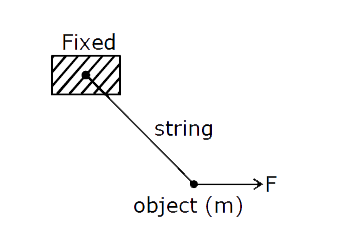
View SolutionIn accordance with Newton’s third law of motion -
View SolutionWhen a 4 kg rifle is fired, the 10g bullet receives an acceleration of `3xx10^(6) cm//s^(2)`. The magnitude of the force acting on the rifle (in newton) is
View SolutionA man of mass 50 kg carries a bag of weright 40 N on his shoulder. The force with which the floor pushes up his feet will be -
View SolutionA block of mass m is placed on a smooth inclined plane of inclination `theta` with the horizontal. The force exerted by the plane on the block has a magnitude
View SolutionIn which of the following graphs, the total change in momentum is zero ?
View SolutionA weight mg is suspended from the middle of a rope whose ends are at the same level. The rope is no longer horizontal. Find the minimum tenstion required to completely straighten the rope.
View SolutionTwo masses 10 kg and 20kg resplectivley are connected by a massless spring as shown in figure. A force of 200 N acts one the 20 kg mass.At the instant shown is figure the 10 kg mass has acceleration of 12 `m//s^(2)`.The vlalue of acceleration of 20 kg mass is

View SolutionTension in the rope at the rigid support is `(g=10m//s^(2))`
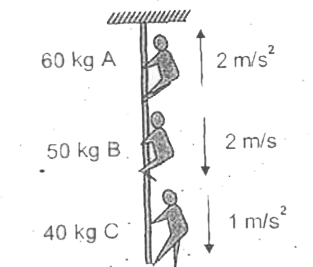
View SolutionTwo bodies of masses `m_(1) " and " m_(2)` are connected a light string which passes over a frictionless massless pulley. If the pulley is moving upward with uniform acceleration `(g)/(2)`, then tension in the string will be
View SolutionIn the figure given below, with what acceleration does the block of mass m will move? (Pulley and strings are massless and frictionless)
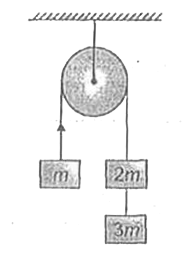
View Solution`T_(1) and T_(2)` in the given figure are
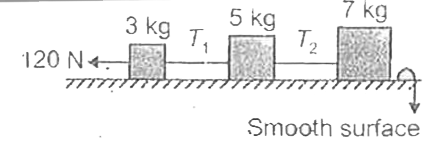
View SolutionIn the arrangement shown, the mass m will ascend with an acceleration ( Pulley and rope are massless)
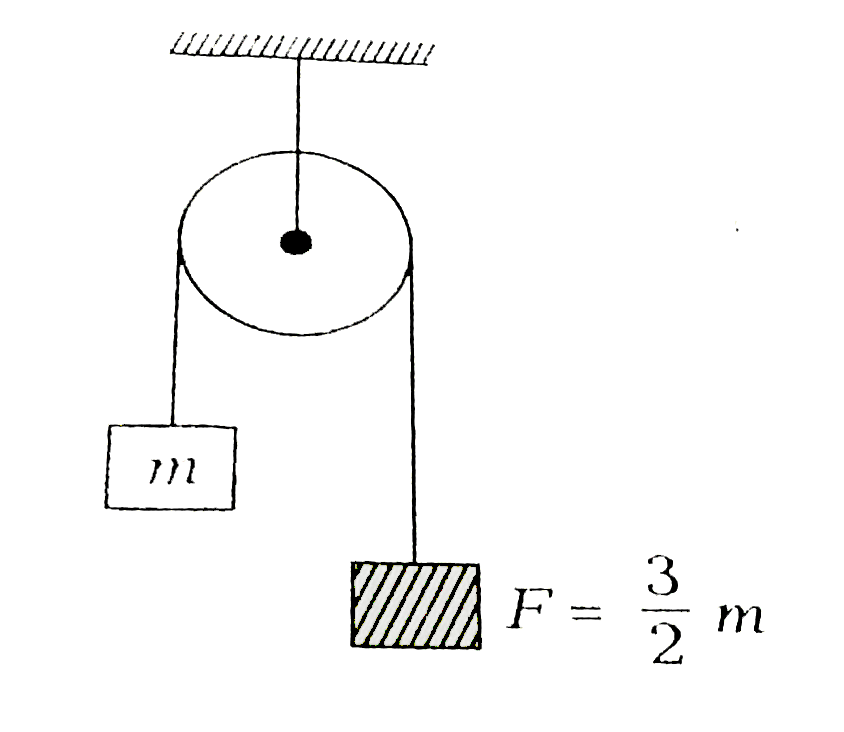
View SolutionA chain of mass M and length L is held vertical by fixing its upper end to a rigid support. The tension in the chain at a distance y from the rigid support is:
View SolutionA man slides down a light rope whose breaking strength in `eta` times his weight `(eta lt 1)`. What should be his maximum acceleration so that the rope just breaks ?
View SolutionIn the arrangement as shown, tension `T_(2)` is `(g=10m//s^(2))`
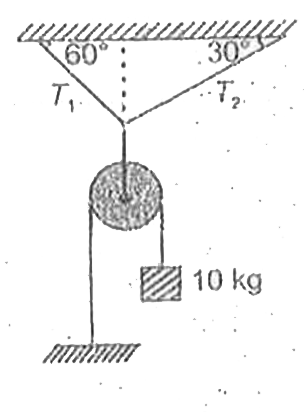
View SolutionIf pulleys shown in the diagram are smooth and massless and `a_(1)` and `a_(2)` are acceleration of blocks of mass 4 kg and 8 kg respectively, then -
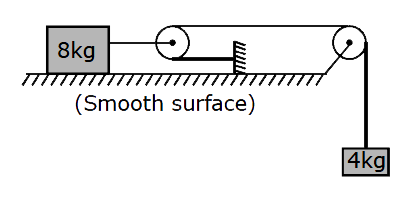
View SolutionFigure shows a uniform rod of length 30 cm having a mass 3.0 kg. The rod is pulled by constant forces of 20N and 32N as shown. Find the force exerted by 20 cm part of the rod on the 10 cm part (all surfaces are smooth) is

View SolutionMr. A, B and C are trying to put a heavy piston into a cylinder at a mechanical workshop in railway yard. If they apply forces `F_(1), F_(2) and F_(3)` respectively on ropes then for which set of forces at that instant, they will be able to perform the said job?
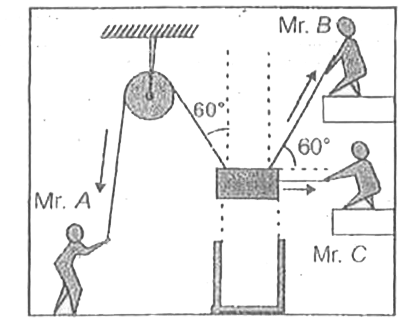
View SolutionIn a rocket, fuel burns at the rate of 2 kg/s. This fuel gets ejected from the rocket with a velocity of 80 km/s. Force exerted on the rocket is -
View SolutionA machine gun fires a bullet of mass 65 g with a velocity of 1300 m/s. The man holding it can exert a maximum force of 169 N on the gun. The number of bullets he can fire per second will be
View SolutionA bullet of mass 40 g is fired from a gun of mass 10 kg. If velocity of bullet is 400 m/s. then the recoil velocity of the gun wil be
View SolutionA diwali rocket is ejecting `0.05kg` of gases per second at a velocity of `400m//sec`. The accelerating force on the rocket is
View SolutionA rocket of mass 5700 kg ejects mass at a constant rate of 15 kg/s withe constant speed of 12 km/s. The acceleration of the rocket 1 minute after the blast is `(g=10m//s^(2))`
View SolutionA ballon has 2 g of air . A small hole is pierced into it . The air comes out with relative velocity 4 m/s . If the balloon shrinks completely in `2.5` s , the average force acting on the balloon is
View SolutionA surface is hit elastically and normally by n bals per unit time, all the balls having the same mass m, and moving with the same velocity v. then the force acting on surface is
View SolutionA particle of mass m strikes a wall with speed v at an angle `30^(@)` with the wall elastically as shown in the figure. The magnitude of impulse imparted to the ball by the wall is
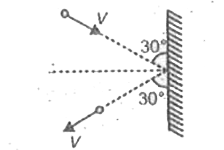
View SolutionA body of mass `1 kg`, initially at rest, explodes and breaks into three fragments of masses in the ratio `1:1:3`. The two pieces of equal mass fly off perpendicular to each other with a speed of `30 m//s` each. What is the velocity of the heavier fragment?
View SolutionA 6 kg bomb at rest explodes into three equal pieces P, Q and R. If P flies with speed 30 m/s and Q with speed 40 m/s making an angle `90^(@)` with the direction of P. The angle between the direction of motion of P and R is about
View SolutionA particle of mass 2m moving with velocity v strikes a stationary particle of mass 3m and sticks to it . The speed of the system will be
View SolutionWhich of the following is a self adjusting force?
View SolutionMaximum force of friction is called
View SolutionThe limiting force of friction betwwen two bodies in contact independent of
View Solution"It is difficult to move a cycle along the road with its brakes on". Why?
View SolutionWhich is a suitable method to decrease friction ?
View SolutionA cubical blocks rests on a plane of ` mu = sqrt(3)`. The angle through which the plane be inclines to the horizontal so that the block just slides down will be
View SolutionA block of mass 1 kg is projected from the lowest point up along the inclined plane. If `g=10ms^(-2)`, the retardation experienced by the block is
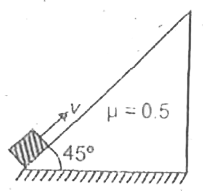
View SolutionA child weighing 25 kg slides down a rope hanging from a branch of a tall tree. If the force of friction acting against him is 200 N, the acceleration of child is `(g=10 m//s^(2))`
View SolutionAn object of mass 1 kg moving on a horizontal surface with initial velocity 8 m/s comes to rest after 10 s. If one wants to keep the object moving on the same surface with velocity 8 m/s the force required is
View SolutionA heavy box is slid across a rough floor with an initial speed of 4 m/s. It stops moving after 8 seconds. If the average resisting force of friction is 10 N, the mass of the box (in kg) is
View SolutionIf a block moving up at `theta = 30^(@)` with a velocity 5m/s, stops after 0.5 sec, then what is `mu`
View SolutionA chain is lying on a rough table with a fraction 1/n of its length hanging down from the edge of the table. if it is just on the point of sliding down from the table, then the coefficient of friction between the table and the chain is -
View SolutionA block has been placed on an inclined plane with the slope angle `theta`, block slides down the plane at constant speed. The coefficient of kinetic friction is equal to
View SolutionA horizontal force of 10N is necessary to just hold a block stationary against as well. The coefficient of friction between the block and the wall is 0.2. The weight of the block is
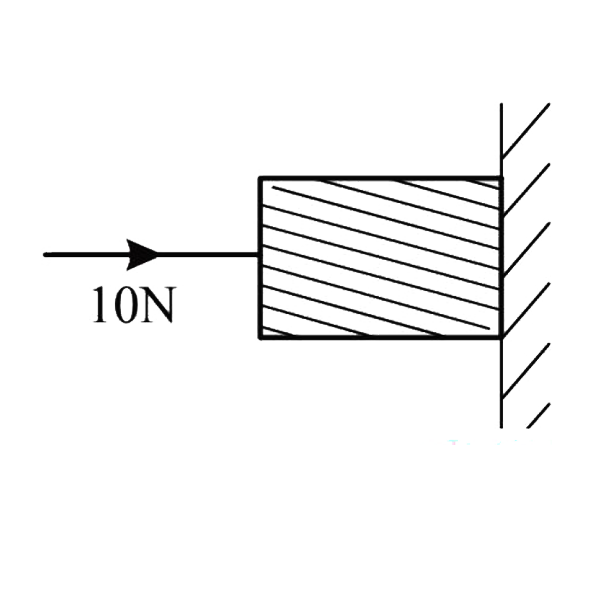
View SolutionIn the figure shown, the coefficient of static friction between the block A of mass 20 kg and horizontal table is 0.2. What should be the minimum mass of hanging block just beyond which blocks start moving?
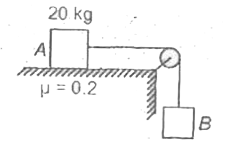
View SolutionTwo block A and B of masses 5 kg. and 3 kg. respectively rest on smooth horizontal surface with B over A. The coefficient of friction between A and B. 0.5 the maximum horizontal force that can be applied to A so that there will be motion of A and B without separation is :-
View SolutionA small metallic sphere of mass m is suspended from the ceiling of a car accelerating on a horizontal road with constant acceleration a. The tension in the string attached with metallic sphere is
View SolutionA cystlist riding a bicycle a bicycle at a speed of `14sqrt(3) ` m/s takes a turn around a circular a circular road of radius `20 sqrt(3)` m without skidding . What is his inclination to the vertical ?
View SolutionA car turns a corner on a slippery road at a constant speed of 10 m /s . If the coefficient of friction is 0.5, the minimum radius of the arc in meter in which the car turns is
View SolutionA car is moving on a horizontal circular track of radius 0.2 km with a constant speed. If coefficient of friction between tyres of car and road is 0.45, then maximum speed of car may be [Take `g=10 m//s^(2)`]
View SolutionA boy is sitting on the horizontal platform of a joy wheel at a distance of 5 m from the center. The wheel begins to rotate and when angular speed exceeds 1 rad/s, the boy just slips. The coefficient of friction between the boy and the wheel is `(g=10m//s^(2))`
View SolutionA vehicle is moving on a track with constant speed as shown in figure. The apparent weight of the vehicle is

View SolutionA train is running at 20 m/s on a railway line with radius of curvature 40,000 metres. The distance between the two rails is 1.5 metres. For safe running of train the elevation of outer rail over the inner rail is `(g=10m//s^(2))`
View SolutionA car is moving on a horizontal circular road of radius 0.1 km with constant speed. If coefficient of friction between tyres of car and road is 0.4, then speed of car may be `(g=10m//s^(2))`
View Solution
Assignment (SECTION-A) questions and complete solutions for chapter LAWS OF MOTION of AAKASH INSTITUTE ENGLISH of Class 12
All Exercises from AAKASH INSTITUTE Class 12 PHYSICS LAWS OF MOTION
- ASSIGNMENT ( SECTION -A)
- ASSIGNMENT ( SECTION -B) objective type questions (one option is correct)
- ASSIGNMENT ( SECTION -C) objective type questions (More than one options are correct)
- ASSIGNMENT ( SECTION -D) Linked Comprehension Type Question
- ASSIGNMENT ( SECTION -D) Linked Comprehension Type Question (Comprehension -I)
- ASSIGNMENT ( SECTION -D) Linked Comprehension Type Question (Comprehension -II) (Choose the correct answer :)
- ASSIGNMENT ( SECTION -D) Linked Comprehension Type Question (Comprehension -III) (Choose the correct answer :)
- ASSIGNMENT ( SECTION -D) Linked Comprehension Type Question (Comprehension -IV) (Choose the correct answer :)
- ASSIGNMENT ( SECTION -E) Assertion - Reason Type Questions
- ASSIGNMENT ( SECTION -F ) Matrix - Match Type Questions
- ASSIGNMENT ( SECTION -G ) Integer Answer Type Questions
- ASSIGNMENT ( SECTION -H ) Multiple True - False Type Questions (Identify the correct combination of true (T) and false (F) of the given three statements.)
- ASSIGNMENT ( SECTION -I ) Subjective Type Questions
- ASSIGNMENT ( SECTION -J ) Aakash Challengers Questions
- Assignment (SECTION-A)
- Assignment (SECTION-B)
- Assignment (SECTION-C)
- Assignment (SECTION-D) (Assertion-Reason Type Questions)
- Example
- EXAMPLES
- EXERCISE
- Illustration
- TRY YOURSELF